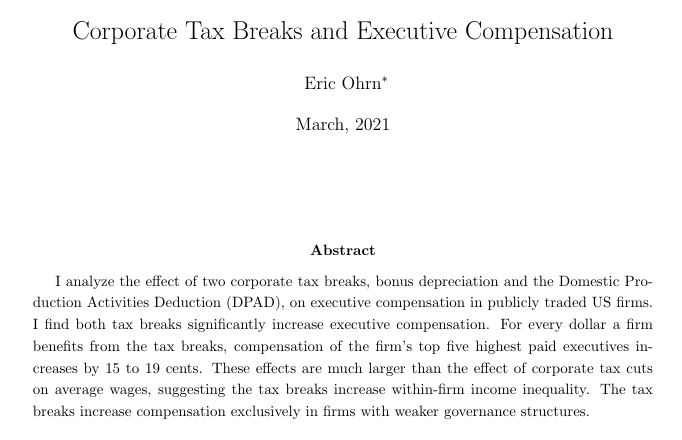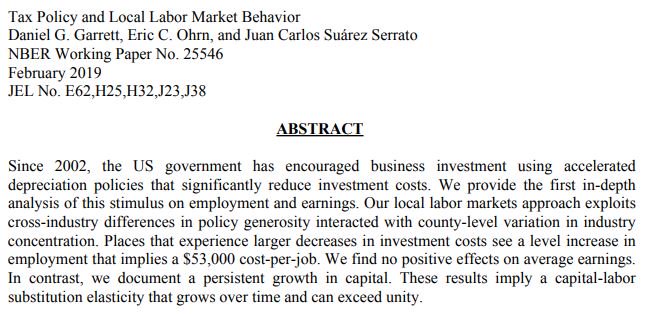It's Friday afternoon. You could do work or you could read this quick thread about my paper with Nathan Seegert that, I am thrilled to say, is now forthcoming at the Journal of Public Economics. 

The paper is titled "The Impact of Investor-Level Taxation on Mergers and Acquisitions."
You can download the published version here for the next few days: authors.elsevier.com/a/1ZRKYAlw9f3ai
An ungated version is here: cs.grinnell.edu/~ohrneric/file…
You can download the published version here for the next few days: authors.elsevier.com/a/1ZRKYAlw9f3ai
An ungated version is here: cs.grinnell.edu/~ohrneric/file…
We started this project in May 2011. So it took like 8 years to publish this thing.
Part of the reason it took so long is because we were both learning how to do research while writing it.
Part of the reason it took so long is because we were both learning how to do research while writing it.
The other reason is because we worked really hard to completely overhaul it several times.
Thank you to our advisers, friends, discussants, and all of the referees that saw this thing. You all made it better.
Thank you to our advisers, friends, discussants, and all of the referees that saw this thing. You all made it better.
So, the idea behind the paper is simple. Typically, the tax rate on firm payouts to shareholders doesn't affect firm investment behavior. This is because the firm can make payouts now or invest the money and make payouts later. One way or the other, the firm pays the same tax.
As a result, the tax rate drops out of the optimization equation.
This revelation is generally referred to as the "new view" of corporate taxation (King 1977, Auerbach 1979, Bradford
1981).
Of course, some assumptions must hold to get this result.
This revelation is generally referred to as the "new view" of corporate taxation (King 1977, Auerbach 1979, Bradford
1981).
Of course, some assumptions must hold to get this result.
We ask whether taxes on payouts (investor-level taxes) affect mergers and acquisitions as opposed to traditional capital investment.
The reason you might think they would: dividend payouts are taxed at the dividend tax rate.
But, if those funds were instead used to finance an acquisition, then the proceeds from the acquisition would be taxed as capital gains (in almost all cases).
But, if those funds were instead used to finance an acquisition, then the proceeds from the acquisition would be taxed as capital gains (in almost all cases).
If the capital gains tax rate is lower than the dividend tax rate, this creates a discount on M&A for firms that would otherwise use the funds to pay dividends.
While we thought we were really clever and came up with this idea first, Alan Auerbach and David Reishus beat us to it by about 25 years.
So anyway, we write down a model showing that this tax discount leads to more mergers by dividend paying firms that are of lower quality when the dividend tax rate is higher than the capital gains rate, as was the case in the US prior to 2003.
The model also shows that there is no tax discount for firms that would otherwise use M&A funds to repurchase shares instead of pay dividends.
This is because share repurchases and proceeds from acquisition are both taxed at the cap gains rate.
This is because share repurchases and proceeds from acquisition are both taxed at the cap gains rate.
We use this second result to test for the effects of the tax discount. We compare the M&A performance of dividend paying firms to share repurchasing firms before and after the 2003 Bush tax cuts which eliminated the preferential capital gains rate and the discount.
We find that M&A quality (measured by stock returns or ROA) improves for dividend paying firms after the reform suggesting that, in fact, the different tax rates prior to 2003 caused inefficient mergers and acquisitions.
We also find some evidence that the tax discount decreased the quantity of mergers made by dividend paying firms.
Critically, these results are strongest for firms with a high percentage of taxable shareholders.
So, thats basically it.
Now, I know that this research on firms and mergers and taxes isn't really as sexy as the crime and inequality and mortality research that all you cool kids do, but here is why you should care anyway:
Now, I know that this research on firms and mergers and taxes isn't really as sexy as the crime and inequality and mortality research that all you cool kids do, but here is why you should care anyway:
1) Efficient mergers and acquisitions reallocate resources to where they can be most productive. We want this!
Inefficient mergers, such as those caused just by weird tax frictions, literally destroy economic value and welfare. This is bad.
Inefficient mergers, such as those caused just by weird tax frictions, literally destroy economic value and welfare. This is bad.
and 2) the M&A market is HUGE.
Our estimates suggest that re-implementing the pre-2003 difference in tax rates and resulting tax discount would destroy $59 billion of the value of M&A in the US annually.
Our estimates suggest that re-implementing the pre-2003 difference in tax rates and resulting tax discount would destroy $59 billion of the value of M&A in the US annually.
Please take a look at the paper if you want to learn more.
Have a nice weekend!
Have a nice weekend!
• • •
Missing some Tweet in this thread? You can try to
force a refresh






